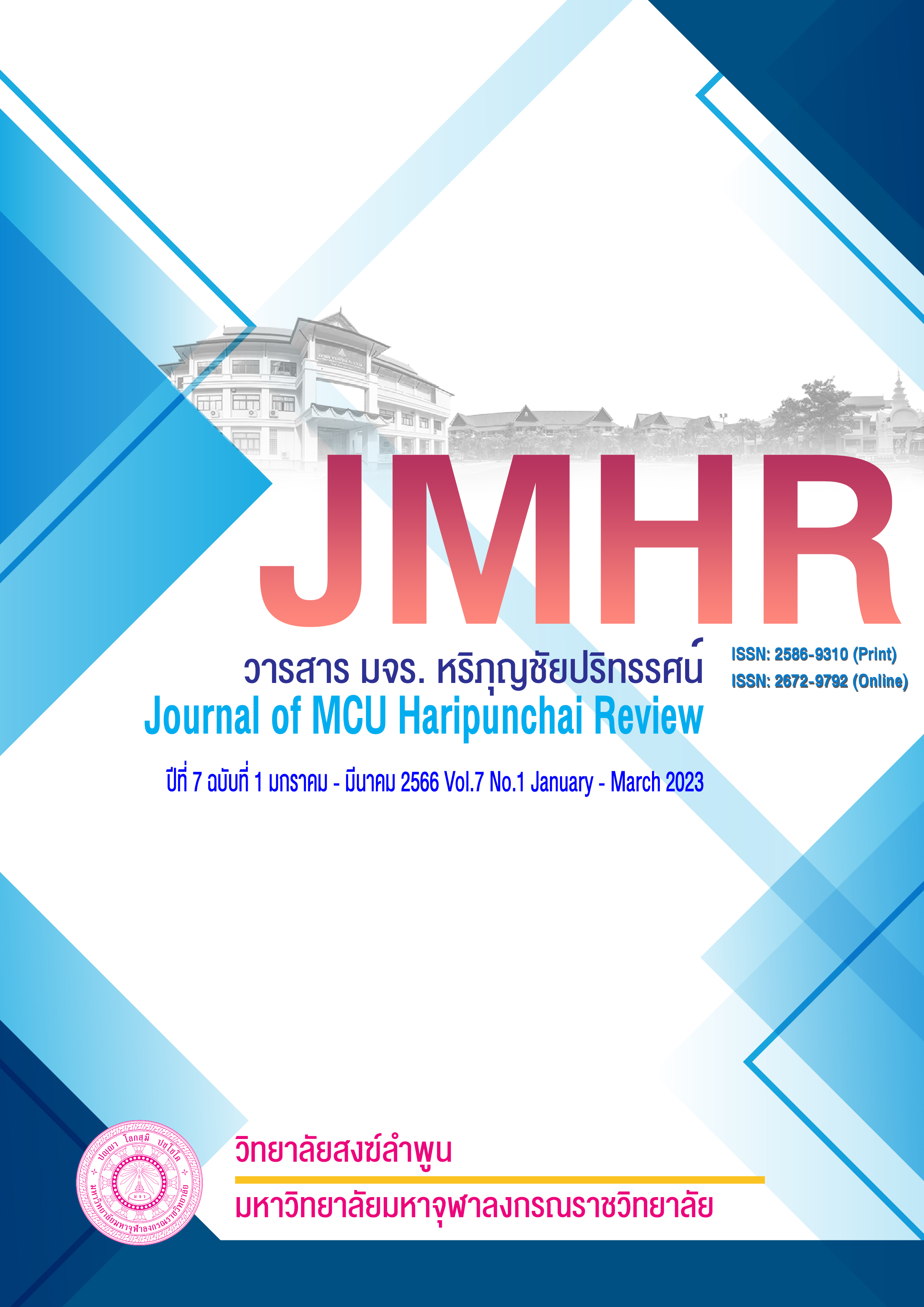Buddhist principles for raising self-worth awareness of the elderly
Main Article Content
Abstract
This article aims to present the concepts of Buddhist principles related to the self-esteem of the elderly. Elderly or old age may refer to: Humans are aging at the end of their lives. The definition of older people can vary from one to other aspects, such as biology, demography, etc. Employment and Sociology. Statistically, it is often considered that those in elderly age are individuals aged 60-65 years and older. For Thailand, the elderly are persons aged 60 years or older. A qualified elderly person must have an awareness of self-worth. Which the elderly sees the importance and value of themselves seeing that one is worth is respected by others Feeling good about yourself recognize that you have the ability Beneficial to oneself, family, and society. However, the use of the four principles of meditation as a tool for raising awareness is necessary and can be applied to raising awareness as well. Which the 4 principles of prayer are the 4 principles of self-improvement is physical development to create a healthy body behavior development to live with people in society with quality and happiness mental development to raise the mind to the elderly with morals and ethics and intellectual development to be aware of the changes of things.
Article Details

This work is licensed under a Creative Commons Attribution-NonCommercial-NoDerivatives 4.0 International License.
References
กระทรวงการพัฒนาสังคมและความมั่นคงของมนุษย์. (2557). ประชากรสูงอายุไทย : ปัจจุบันและอนาคต. ศูนย์เทคโนโลยีสารสนเทศและการสื่อสาร : สำนักงานปลัดกระทรวงการพัฒนาสังคมและความมั่นคงของมนุษย์.
นันทา ธงชัยสุริยา. (2562). “การศึกษาการสร้างเสริมการเห็นคุณค่าของตนเองในพระพุทธศาสนาเถรวาท”. วารสารนวัตกรรมการศึกษาและการวิจัย. 3(2) : 101.
นาถยา คงขาว. (2559). “ผลการปรึกษากลุ่มแบบอัตถิภาวะนิยมต่อการตระหนักรู้ในตนเองของ นักเรียนชั้นมัธยมศึกษาตอนต้น”. วิทยานิพนธ์วิทยาศาสตรมหาบัณฑิต. คณะศึกษาศาสตร์ : มหาวิทยาลัยบูรพา.
บรรลุ ศิริพานิช และคนอื่นๆ. (2541). การออกกำลังกายเพื่อสุขภาพสำหรับผู้สูงอายุ. นนทบุรี : หมอชาวบ้าน.
ปรีดี ทุมเมฆ. (2560). “การพัฒนาความตระหนักรู้ในคุณคาของตนเองสำหรับนักศึกษาระดับปริญญาตรี มหาวิทยาลัยราชภัฏในภาคตะวันออกเฉียงเหนือ”. วิทยานิพนธ์รัฐประศาสนศาสตรดุษฎีบัณฑิต (รัฐประศาสนศาสตร์). บัณฑิตวิทยาลัย : มหาวิทยาลัยราชภัฏมหาสารคาม.
พระครูกิตติชัยกาญจน์, พระครูศรีธรรมวราภรณ์ และ พระมหาสุวัฒน์ สุวฑฺฒโน. (2563). “รูปแบบการส่งเสริมสุขภาพตามหลักภาวนา 4 สำหรับโรงเรียนผู้สูงอายุ วัดหนองไม้แก่น อำเภอท่ามะกา จังหวัดกาญจนบุรี”. วารสารมหาจุฬานาครทรรศน์. 7(12) : 224 - 225.
พระครูปทุมภาวนาจารย์ วิ. และ เสริมศิริ อัครพุฒิพันธ์. (2562). “หลักภาวนา 4 กับการพัฒนาปรีชาเชิงอารมณ์ของวัยรุ่นไทยในสังคมยุคดิจิทัล”. วารสารพุทธจิตวิทยา. 4(1) : 137 - 139.
มหาจุฬาลงกรณราชวิทยาลัย. (2539). พระไตรปิฎกภาษาไทย ฉบับมหาจุฬาลงกรราชวิทยาลัย.
กรุงเทพมหานคร : โรงพิมพ์มหาจุฬาลงกรราชวิทยาลัย.
วราพร วันไชยธนวงค์, วราภรณ์ ยศทวี และ จุฬาวรี ชัยวงค์นาคพันธ์. (2560). “การพัฒนาความตระหนักในคุณค่าของชีวิตสำหรับนักศึกษาพยาบาล”. วารสารวิทยาลัยพยาบาลบรมราชชนนี อุตรดิตถ์. 9(2) : 112.
สถาบันเวชศาสตร์ผู้สูงอายุ. (2545). การออกกำลังกายทั่วไปและเฉพาะโรคผู้สูงอายุ. นนทบุรี : โรงพิมพ์ชุมนุมสหกรณ์การเกษตรแห่งประเทศไทย.
สำนักงานพัฒนาสังคมและความมั่นคงของมนุษย์จังหวัดลำพูน. (2562). สถานการณ์ผู้สูงอายุและคนพิการจังหวัดลำพูน ประจำปี 2562. [ออนไลน์]. แหล่งที่มา : http://www.lamphun.m-society.go.th [27 ธันวาคม 2565].
สำนักพัฒนาสุขภาพจิต, กรมสุขภาพจิต กระทรวงสาธารณสุข. (2545). คู่มือการส่งเสริมสุขภาพที่พึงประสงค์ในผู้สูงอายุสำหรับบุคลากรสาธารณสุข. นนทบุรี : สำนักพัฒนาสุขภาพจิต.
สุทธินันท์ น้ำเพชร. (2542). “ความสัมพันธ์ ระหว่างปัจจัยคัดสรรกับการปรับตัว ของผู้สูงอายุภายหลังเกษียณอายุราชการในจังหวัดเพชรบุรี”. วิทยานิพนธ์วิทยาศาสตรมหาบัณฑิต. บัณฑิตวิทยาลัย : มหาวิทยาลัยมหิดล.
ไสว พราหมณี. (2541). นโยบายรัฐบาลเกี่ยวกับผู้สูงอายุ. กรุงเทพมหานคร : มหาวิทยาลัยมหิดล.
Bloom, Benjamin S.. (1971). Handbook on Formative and Summative Evaluation of Student Learning. New York: McGraw-Hill Book Company, 1971.
Koffka. (1978). Encyclopedia of the Social Sciences. New York : The Macmillan Company.
Maslow. (1970). “Motivation and personality”. Journal of consulting and clinical psychology. New York : Harper and Row.
Steven J. Breckler. (1986). Handbook of Motivation and Cognition: Foundations of Social Behavior. New York: Johns Hopkins University. Guilford Press.


